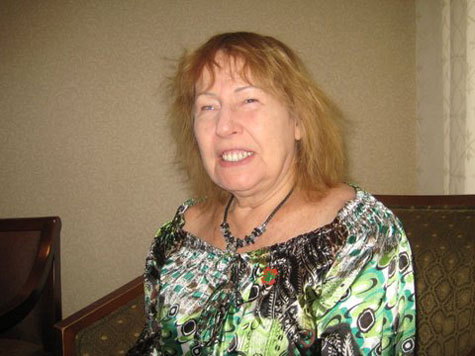
‘SAVED’ Musikka.
|
Thirty-five years ago, a doctor took Elvy Musikka aside and told her that she’d go blind from her glaucoma if she didn’t start smoking. Marijuana, that is. At first, the mother of two balked; then she lit up a joint in her kitchen. She’s been celebrating ever since.
Today, thanks to the 12 medically-approved marijuana cigarettes she smokes or ingests every day — legally now — she can see. “Really, I’d be the last person you’d expect with a joint,” said Musikka, now 70 and a grandmother, who keeps her stash in her pocketbook. “Marijuana saved me. It is God’s most wonderful gift to my life.”
Sighted, Musikka had little trouble reading Big Book of Buds, Reefer Madness, and other pot publications circulating at the recent National Clinical Conference on Cannabis Therapeutics in Warwick.
The event, held over two days at the Crowne Plaza Hotel, drew about 300 people from throughout the country, including doctors, academics, nurses, licensed growers, and, in large numbers, patients like Musikka, who flew all the way from her home in Eugene, Oregon, to praise the plant.
Doctors in wingtips sat side-by side with pony-tailed and pig-tailed growers (or “caregivers”) in the hotel’s Grand Ballroom, as academics from as far away as Brazil gave highly scientific presentations about how marijuana helps people with severe, chronic, and debilitating illnesses, such as HIV, cancer, and Multiple Sclerosis. Participants seemed hopeful that the public is finally beginning to recognize marijuana’s therapeutic value.
“People need to get it in their head that this is a real drug, a real medicine,” said Dr. David Bearman, of Santa Barbara, who sold copies of his book, Demons, Discrimination, and Dollars: A Brief History of the Origins of American Drug Policy. “People need to get out of their minds 95 years of propaganda.”
In many ways, Rhode Island was a fitting location for the seminar, sponsored by Patients Out of Time, a national marijuana advocacy group, and the University of California-San Francisco Medical School. In Rhode Island, medical marijuana has been legal since 2006, and this summer three state-licensed “compassion centers” might open to make it easier for the state’s 1562 medically-approved marijuana patients to get the plant.
Also, the General Assembly is weighing a measure — already adopted by 13 states — to decriminalize possession of an ounce or less of marijuana. State Senator Joshua Miller, a Cranston Democrat who is spearheading the initiative, estimates that the state could save up to $11.1 million per year in court costs.
Jim Fowler, 44, of Palmyra, Maine — patient, grower, contributor to Far Out magazine, author of a medical marijuana handbook, and hawker of $80 bongs and an organic spray that protects pot leaves from grow-light burns — said the country should go one step further.
“Out and out legalization,’’ said Fowler, who prefers to smoke marijuana, rather than pop Percocets, to relieve his back pain. “What we’re talking about here is [more] benign than drinking a beer.”
Like any advocacy group, the cannabis crowd is passionate about its beliefs — and knowledgeable about the product. More often than not, a simple query — “Where are you from?” — prompted a friendly lecture about, say, the “neuropsychobiological evidence for the expression of cannabinoid CB2 receptors in the brain” or the Federal Drug Administration’s dimwitted failure to acknowledge the plant’s medical efficacy.